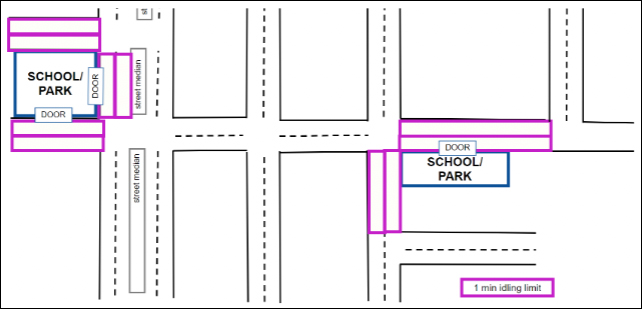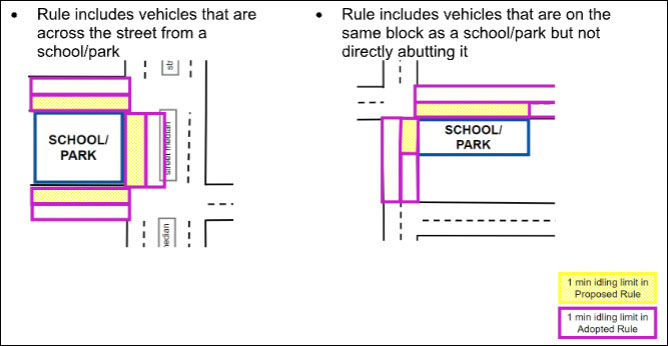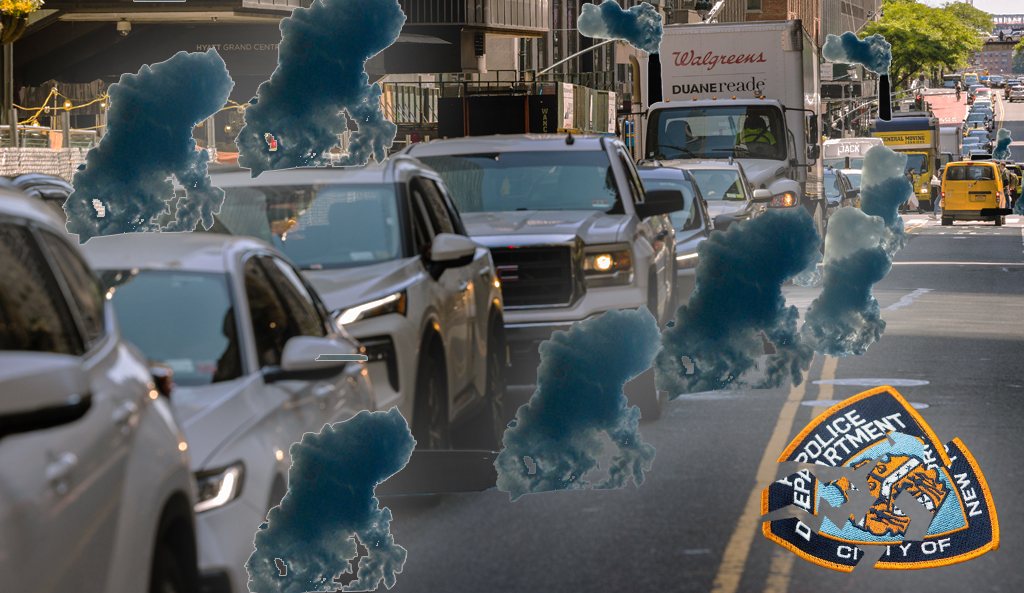The city's one-minute idling rule for vehicles near schools and parks will apply to vehicles parked next to, across from, or on the same block as those schools and parks, thanks to a reversal of course by the Department of Environmental Protection on a proposal that would have enforced idling only against drivers parked in a lane immediately adjacent to the school or park.
DEP amended the proposed rule in response to feedback from advocates concerned that the initial wording would reduce the amount of space covered by the one-minute rule.
"We think this does a much better job of expanding the area that would be subject to the 'one-minute rule' compared to the draft regulations that we had proposed earlier this year," DEP Commissioner Rohit Aggarwala told Streetsblog. "This final rule nearly doubles the area that there will be the one-minute requirement, compared to the draft rule that DEP had put forward earlier."
Under the new rule, a vehicle parked on the same block as a school or park would only be exempt from the one-minute limit on idling if there is concrete median between the school or park and the vehicle. Cars parked on the opposite site of a cross street are also exempt. Those exemptions reflects the history of determinations made by judges at the city's Office of Administrative Trials and Hearings, Aggarwala said.

Drivers may idle up to three minutes in locations not covered by the one-minute rule, according to city law.
DEP's initial proposal faced backlash from advocates and participants in the agency's citizen complaint program, which allows the public to report commercial idling and earn a small bounty if OATH finds the violator guilty. The proposal would have exempted any vehicle parked across the street from a school or park, as well as any vehicle parked on the same side of the street, but not directly in front of the school or park.
The middle-ground final rule released on Tuesday originated with the non-profit Natural Resources Defense Council, which said the DEP's initial clarification of the one-minute regulation was "illogically narrow," the group said in a letter to the agency.
"It makes sense to amend the final definition of 'adjacent' so that it applies to motor vehicles that are parked, stopped or standing on the same block as a school or park, regardless of what side of the street the vehicle is on," NRDC Senior Attorney Eric Goldstein wrote, citing an OATH decision that concluded the one-minute rule applied "only to a block face on which the school has an entrance or exit."
As such, the change in language "is a victory for common sense and public health protection," Goldstein told Streetsblog. "The old definition ... lacked precision."
Clean-air advocates welcomed the compromise — while noting that it left areas very close to schools and parks outside of the one-minute enforcement zone.
"I'm glad that DEP walked back their original awful rule, but New York's students are still at risk," said Aaron Jacobs, a schoolteacher and member of the New York Clean Air Collective. "Many schools sit on streets with medians — which don't stop air pollution — and the Adams Administration's new rule leaves them unprotected."

New York City's idling ban dates back to 1972, but enforcement lagged before the citizen complaint program. The number of citizen complaints has grown exponentially in recent years, from 9,070 in 2019 to around 80,000 in 2023.
Around two-thirds of complaints result in DEP idling violations, with each ticket adjudicated by OATH judges. DEP in turn uses the idling violations as leverage to compel companies to commit to convert their fleets to all electric vehicles in exchange for an exemption to the anti-idling law — much to the chagrin of citizen complainants frustrated that idling persists unchecked in the time being.
A proposal in the City Council — Intro. 941 — could further neuter the power of citizen idling enforcers, advocates warned. The bill, which the Council has on the agenda for a Sept. 18 hearing despite having no co-sponsors, would allow school bus idling for 15 minutes each hour, provide discounts to violators who install "anti-idling technology" on their vehicles and create a way for DEP to ban citizen enforcers who violate an as-yet-undetermined "code of conduct."
Patrick Schnell, a Brooklyn pediatrician who participates in the citizen enforcement program, praised the DEP for amending its one-minute-rule language, but cautioned about Intro 941.
"[The new] rule would become meaningless if Intro 941 is adopted," he said. "This new bill would gut citizen enforcement and undermine the gains of the Citizens Air Complaint Program."
Correction: An earlier version of this story misstated what kinds of vehicles are subject to the one-minute rule: All vehicles are subject to it, but citizens who want to report vehicles can only do so against commercial vehicles. The story also mischaracterized Intro. 941 as prohibiting more than one violation per day for a vehicle illegally idling at a single location. The bill would in fact explicitly prohibit violators from citing multiple infractions at one location as reason to invalidate any of those infractions.






